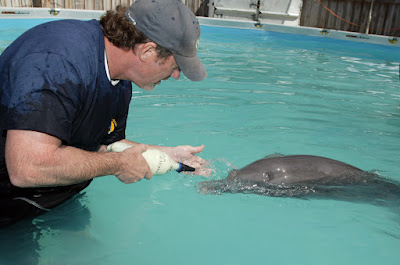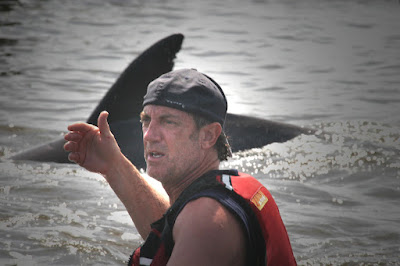It's fascinating to think of how many different kinds of interesting careers a young person can dream of pursuing. Whether your interests be the arts, terrestrial jungles, oceans or the universe itself, paths exist for those with a passion to do the necessary preparation. It all begins with a dream. So many young people have had their life passion triggered by a childhood experience.
Stephen McCulloch has spent decades working professionally in both the marine mammal zoological industry and conservation research communities around the world. His expertise has opened doors to experiences that few of us can even imagine. When I contacted him last week he had just returned from Norway where he had been consulting on a project involving a beluga whale dubbed the Russian Spy Whale. (Read about it here on Wikipedia: https://en.wikipedia.org/wiki/Hvaldimir)
* * *
McCulloch's "journey down the dolphin trail" began when he was ten years old. His family was at a Florida park where he'd gone off exploring and came across a baby dolphin in a pool. When he snuck back later he got busted by the captain who ran the park, but he never forgot the experience of interacting with that young dolphin.
His teen years included a number of entrepreneurial ventures that would prepare him for future career moves, but the passion for dolphins never dissipated. When he was accepted to the U.S. Military Academy in Georgia, he ran away from home and went to work with dolphins. He loved their playful nature.
These were the early years of the marine mammal industry and he became a dolphin trainer. Some heartbreaking experiences involving mistreatment of dolphins by others haunted him. The Marine Mammal Protection Act of 1972 was a step forward for dolphins and sea lions everywhere. After ten years following this path he went north to New York in the 1980's.

EN: What did you do in New York in the 80s?
Stephen McCulloch: After retiring my beloved (3) dolphins and (2) sea lions to an idyllic sea sanctuary, I relocated from the Florida Keys to New York City, where my first job was piloting tour boats in the NY Harbor. In fact, Billy Joel got married to Christy Brinkley aboard one of our yachts. Later, as First Officer aboard the Empress of New York, I rescued a boat and several passengers from sinking in the East River. The owner was so grateful, that he offered me a job at his company selling voice and data systems. It was here that I was able to hone my selling and management skills. Besides, it was the 80's and one of the best time to be doing anything and everything. Quite an education.
EN: What led you to return to the marine mammal field?
 |
| McCulloch with friend Jacques Mayol |
EN: Your website states that you developed the Dolphin First™ approach to marine mammal care. What is unique about this approach and how did you come to trademark it?
SM: The term Dolphin First was developed after years of seeing dolphins (and other sea animals) being put last, just like the dedicated caregivers who spend every waking hour thinking about their animals. In some cases, both dolphins and staff were treated as expendable commodities... easier to replace, than to provide professional, pro-active and consistent care... or suitable salaries. Therefore, my Dolphins First philosophy, really starts with putting People First, because it is essential to have a dedicated team of experienced professionals involved in every aspect of the animals' health and welfare.
EN: You are now a consultant in the marine zoological field and conservation research. Who are your clients and what kinds of projects do they contact you for?
But in keeping with the Dolphin-First trajectory, my real clients are the dolphins themselves. With that in mind, and after successfully rehabilitating two 'captive' dolphins to return to their native waters--the Indian River Lagoon in 1995--I embarked on a new mission to protect their wild counterparts. That resulted in efforts to create a series of revenue generating specialty license plates that would sustain long-term research and conservation studies in the same region.
I successfully passed several state laws and developed a multi-disciplinary research and conservation program at the renowned Harbor Branch Oceanographic Institution, located in Fort Pierce, FL. It was here that we built our stranding center and laboratories that hosted numerous science-based programs, from the rescue and treatment of sick and injured sea mammals, advancement of novel tools and techniques to conducting two decades of field studies on the local dolphin population of more than 1,000 wild dolphins. In those two decades, we collectively published more than 130 peer-reviewed publications, mostly on using dolphins as "sentinels of ocean and human health."
It is here that my mentor and dear friend Dr. Gregory Bossart developed the concept for building a One Ocean, One Health Center. He was ahead of his time, was always the smartest person in the room, and at the same time one of the most kind and humble people I've ever known. It is Dr. Bossart's One Ocean One Health vision that I am working to create here in the Florida Keys, where I still serve on the front lines to rescue, conserve and protect marine mammals and the vital resources we all share.
* * *
* * *
Stephen McCulloch is one of the few professionals to have worked for decades with both the marine mammal zoological industry and conservation research communities around the world. His broad understanding of today’s issues and his global perspective enable him to offer singularly creative solutions to meet the demands of an ever-changing seascape.
Related Links
All photos on this page courtesy Stephen McCulloch


















No comments:
Post a Comment